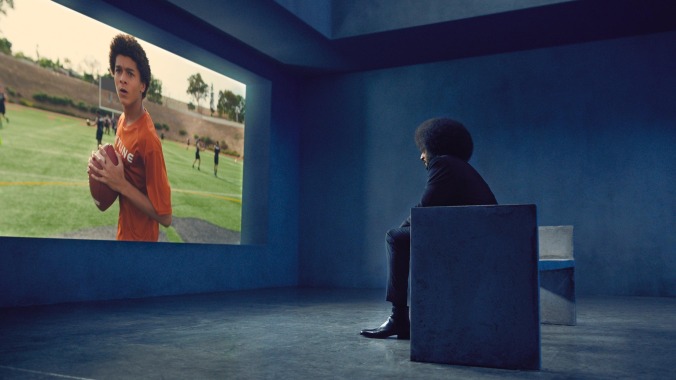Colin In Black And White loses its significant message in an overstuffed plot
The biographical Netflix dramedy struggles to bring Colin Kaepernick's poignant story to TV

“Since the day I was born, I’ve never been anybody’s first choice,” Colin Kaepernick declares in an episode of Netflix’s Colin In Black And White. The limited series is an attempt to explore the activist and renowned football player’s origins. Kaepernick spent his teens facing discrimination while training to be an athlete. This time of his life sheds light on his resolute decision to kneel during the national anthem to protest police brutality in 2016. It’s a story that deserves to be told.
Unfortunately, Colin In Black And White struggles to vividly convey the weight of Kaepernick’s coming-of-age years. The show crams an essential backstory with pivotal social messages only to overcomplicate it with more narrative threads than it can handle. Co-created by Kaepernick and the formidable Ava DuVernay, the cast features solid names like Nick Offerman and Mary Louise Parker, as well as breakout young actor Jaden Michael, who plays young Colin. Their collective talent falls short here.
For starters, the cast chemistry in Colin is unsteady, especially between the actors playing the central family. Colin is biracial with adoptive white parents, Rick (Offerman) and Theresa (Parker), growing up in a conservative California town. In trying to portray the dissonance in how the world treats them, the show dramatizes circumstances from Kaepernick’s day-to-day life. The mostly stiff performances don’t match the evocative events.
The first episode, “Cornrows,” features a young Colin struggling to manage his afro and wanting to get braids. A well-meaning couple, Rick and Theresa mostly view Colin’s hair woes as a distraction keeping him from practice. The burden unfortunately (and rather expectedly) falls on Colin to find his voice in a family that isn’t equipped to truly hear him.
The moments when Colin’s parents do try to immerse themselves in Black culture, like Theresa taking Colin to a Black barbershop (with much trepidation), lack resonance. It’s hard to tell if Offerman and Parker’s odd and restrained performances reflect their real-life counterparts’ personalities, or if the characterization is off. But Rick and Theresa come across poorly as two people who love and encourage Colin, while making little to no effort to understand his dilemmas beyond sports.
The rare times the show succeeds in highlighting the uncomfortable gap between Colin and his parents, like in the third episode, is a mere hint of the team’s capabilities. While traveling for football games one summer, Colin is pulled over by a white police officer. Rick and Theresa don’t grasp the intensity of the encounter from the passenger side, as the cop almost pulls a gun on the teen. They laugh it off and casually remark that their son “dodged a bullet.” The already ignorant statement is even more objectionable in light of the current political climate, which spurred Kaepernick’s activism that halted his burgeoning career in the first place.
The young series lead Michael anchors the show amidst its lapses. He brings a palpable range of emotions to Colin as the teen undergoes challenges of various magnitudes in the six-episode season: the pressure to pursue baseball over football, facing bigotry at various tournaments, selfish coaches manipulating his moves, and even some girl troubles. Colin’s impressive skills and passion to play as a quarterback inspire him not to fall in line with what others expect of him—a trait Kaepernick carries to this day.
But the show’s emotional punches are inelegant and too on-the-nose. Kaepernick narrates the show, with chunks of half-hour episodes devoted to the athlete in the present day as he revisits his childhood from within a gray-walled room. His charisma sadly doesn’t translate to the monologues he is made to deliver. Kaepernick’s speeches are unsubtle and heavy with exposition, because Colin In Black And White believes more in the telling than showing.
DuVernay and her crew take creative risks with mixed results to contextualize Kaepernick’s position in history. The show sometimes meanders away from his story to focus on prominent figures like fellow athlete Allen Iverson, or baseball player-turned-artist Romare Bearden. There are also vignettes unpacking microaggressions toward Black people in the workplace, but they look like they’re straight out of a company’s HR training video.
Instead, a takedown of the word “thug” is much more effective in how it utilizes real-life examples, including former President Donald Trump using it repeatedly to perpetuate a negative narrative toward a marginalized community. Colin In Black And White transforms its lead character’s romantic problems into a gateway to discuss beauty standards for Black women. It’s yet another noble effort that gets lost in the shuffle of navigating one too many storylines over the course of three hours.
The drawback of exploring all these different angles is that Colin’s story tends to lose momentum. The show is structured to jump from one momentous experience to another, and how they paved the road for his eventual success at the University Of Nevada, followed by his time with the San Francisco 49ers—all leading up to his publicly scrutinized and polarizing form of protest. It’s already a massive undertaking to dive into his upbringing, and Colin In Black And White only sporadically tugs at heartstrings or provides meaningful insight while doing so.